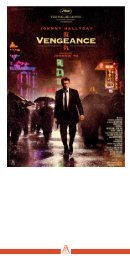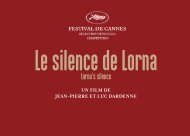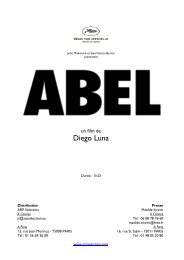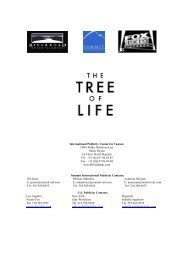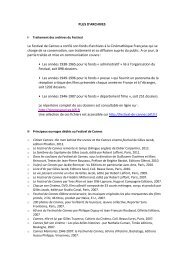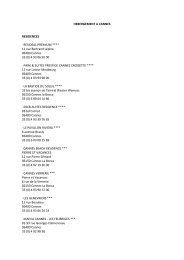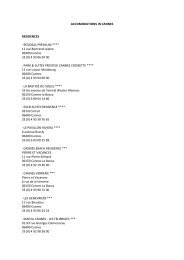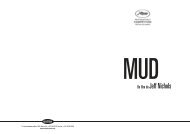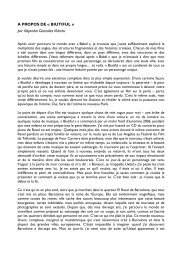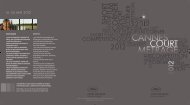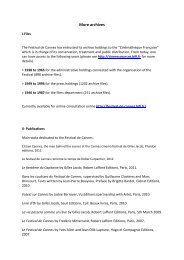“I want to write something new, something extraordinary and ...
“I want to write something new, something extraordinary and ...
“I want to write something new, something extraordinary and ...
You also want an ePaper? Increase the reach of your titles
YUMPU automatically turns print PDFs into web optimized ePapers that Google loves.
Luhrmann, as he did with “Romeo + Juliet” <strong>and</strong> “Moulin Rouge!,” has once<br />
again taken a classic s<strong>to</strong>ry <strong>and</strong> incorporated popular contemporary music with<br />
period score, making the audience’s experience of the film as rich <strong>and</strong> full, <strong>and</strong> as<br />
timeless, as possible.<br />
“Fitzgerald forged <strong>new</strong> ground, gaining both fame <strong>and</strong> no<strong>to</strong>riety for<br />
referencing this <strong>new</strong> <strong>and</strong> explosive sound called jazz in his work, actively telling s<strong>to</strong>ry<br />
via the immediacy of pop culture,” Luhrmann relates. “As I’ve done in the past, I<br />
<strong>want</strong>ed <strong>to</strong> bring this tale in<strong>to</strong> the present day, while respecting the time in which it<br />
takes place, because no matter how hard one tries we’ll never quite underst<strong>and</strong><br />
what it felt like—what jazz was in 1925.”<br />
Fitzgerald coined the term “the Jazz Age,” <strong>and</strong> the phrase encapsulated so<br />
much more than just the music of the era—it was about being modern, it was about<br />
youth culture, <strong>and</strong> it represented the energy of the time: the Roaring Twenties. As<br />
such, Luhrmann <strong>want</strong>ed the music <strong>to</strong> be a reflection of our time, while still helping <strong>to</strong><br />
tell this classic s<strong>to</strong>ry.<br />
An<strong>to</strong>n Monsted, executive music supervisor <strong>and</strong> co-producer on the film,<br />
says, “The soundtrack <strong>to</strong> ‘The Great Gatsby’ had <strong>to</strong> meet everybody’s expectations,<br />
because on the one h<strong>and</strong> it’s a heartrending love s<strong>to</strong>ry about a broken dream, but<br />
it’s also a s<strong>to</strong>ry known so much for its parties <strong>and</strong> its excessive, decadent world. We<br />
k<strong>new</strong> it needed <strong>to</strong> include bombastic, loud, exciting party music—hip-hop, music of<br />
the streets—as well as music that expresses the tragic romance <strong>and</strong> a love that can<br />
never be fully realized.<br />
<strong>“I</strong> think Baz certainly identified very early on that <strong>to</strong> listen <strong>to</strong> jazz music <strong>and</strong> <strong>to</strong><br />
enjoy jazz music in the early 1920s was somewhat <strong>to</strong> flirt with danger,” Monsted<br />
continues. “So, finding a translation <strong>to</strong> the times that we’re living in <strong>and</strong> <strong>to</strong> the times<br />
that our audience is living in…that was probably our big musical discussion <strong>and</strong> our<br />
big music challenge.”<br />
Their discussions turned <strong>to</strong> hip-hop, which has its roots in jazz. “You know, jazz is<br />
African-American music, <strong>and</strong> it’s s<strong>to</strong>rytelling music,” says Luhrmann. “Both of those<br />
musical forms were about pure, absolute self-expression.”<br />
There could be no one better <strong>to</strong> collaborate with Luhrmann on his concept of<br />
the music than rapper <strong>and</strong> producer extraordinaire Shawn “JAY Z” Carter, who<br />
ultimately served as executive producer on “The Great Gatsby” as well as a<br />
contribu<strong>to</strong>r <strong>to</strong> the soundtrack.<br />
25




